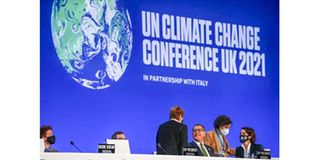Women push for inclusion in climate change talks

The COP26 UN Climate Change Conference in Glasgow on November 11, 2021. Women are pushing for their inclusion in climate change talks.
What you need to know:
- With prolonged drought, food production is decimated and women, being the ones who collect food, fall into distress over feeding their families.
- At the 26th COP at Glasgow, Scotland last year, UN Women and the Scottish government launched a call to action seeking inclusion of women in tackling the climate crisis.
Women can no longer be ignored in climate change conversations, a climate justice activist has said.
Ms Stella Agara, economic justice and climate action lead at Akina Mama wa Africa, a Pan-African women's rights organisation, said women continue to be pushed to the sidelines even though they bear the brunt of climate disasters.
“One of the biggest challenges that women are facing is exclusion from conversations on climate change,” she said during a webinar on Cross-sector partnerships in East Africa to advance women's economic resilience.
The event held on Thursday was convened by New Faces, New Voices-Kenya.
Domestic violence
With prolonged drought, food production is decimated and women, being the ones who collect food, fall into distress over feeding their families. Often, they become vulnerable to domestic violence, yet their unique challenges induced by climate change are ignored in climate justice policies, she argued.
“It is the men who get invited by the local chief to contribute to a [policy] paper. [This paper] is then submitted to COP (UN Climate Change Conference of Parties) by men by virtue of the fact they are the majority leaders,” she said.
“It is men who sit to make decisions on climate solutions. They then expect the women to implement those solutions. The question is: ‘Where are the women in those conversations?’”
At the 26th COP at Glasgow, Scotland last year, UN Women and the Scottish government launched a call to action seeking inclusion of women in tackling the climate crisis.
Dubbed Glasgow Women’s Leadership Statement on Gender Equality and Climate Change, the leaders put pressure on governments and civil society to commit to increased and sustained support for women and girls’ climate change initiatives.
“We…call for all climate actions to recognise the differentiated impact of climate change by factors such as age, gender, disability and location,” the leaders said in the call to action statement.
Resilience
The conference ended with 11 countries making new commitments to strengthen the resilience of women and girls against climate shocks.
Canada promised to allocate 80 per cent of its $4.3 billion climate investments over the next five years to gender equality outcomes.
The United Kingdom pledged $223 million in funding to address dual challenges of gender inequality and climate change. Belgium also committed to a Sahel Climate Programme focused on the needs of women and girls, with a five-year investment of $58 million.
Other countries that enlisted their concrete actions to mainstreaming gender equality and equity in climate processes were Bolivia, Norway, Sierra Leone, United States, Ecuador and Germany.
Nigeria and Sweden particularly set out to review their national climate action plans to embed gender equality as a target to be achieved in efforts to reduce global warming.
In 2019, at COP 25, countries agreed to a five-year enhanced Lima work programme on gender and its gender action plan, which affirmed deployment of gender-responsive technological solutions to address climate change, and active involvement of women in climate-related processes.
This plan has yet to meet its target, going by the events at the ongoing COP26. Last week, UN Women and the Scottish government launched a call to action, urging leaders in government and civil society to commit to an increased and sustained support for women and girls’ climate change initiatives.





